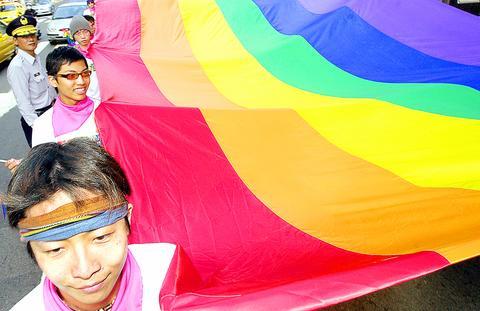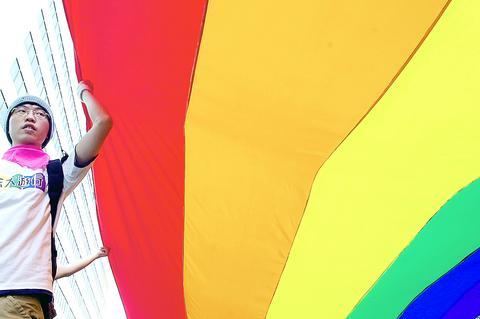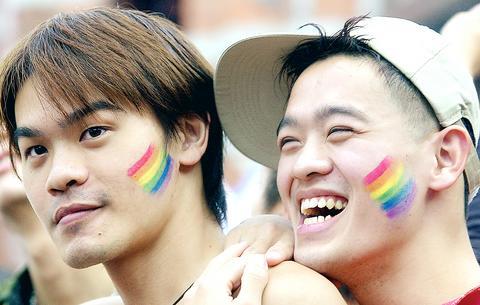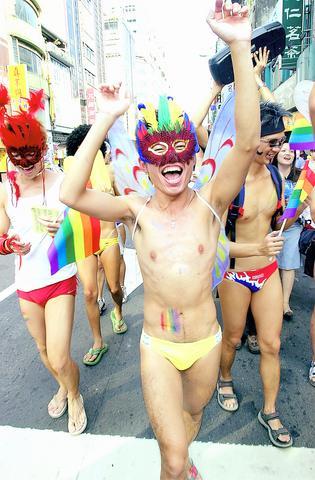Carrying rainbow flags, nearly 1,000 gays, lesbians, bisexuals, trans-genders and their supporters marched along a 1.5km stretch of downtown Taipei in the first gay pride parade in Taiwan yesterday afternoon.
Welcoming those who came to join them with cheers and hugs and shouting, "We are homosexuals! We love you!" to hundreds of spectators along the way, the joyful procession marched for 30 minutes from 228 Park (二二八和平公園), along Hengyang Road (衡陽路), to the Red Playhouse (紅樓) in Ximending.

"I certainly wish we could go on [and march] for three hours across the city, but this is already a good start," said Lee Ming-chao (李明照), director of Taiwan Tongzhi Hotline (台灣同志諮詢熱線), a major homosexual help group, which organized the parade. The word "tongzhi" means comrade and includes gays, lesbians, bisexuals and trans-genders.

Tokyo held its first lesbian and gay parade in 1994 and it has since been held sporadically. In South Korea, 600 marched around a park in Seoul, in June, for its first Lesbian and Gay Parade. Homosexuals in Thailand have the Bangkok Gay Pride Parade, which grows bigger every year and was said to be have attracted 200,000 marchers last year, according to city officials.
"Tokyo did it. Thailand did it. Since Taipei bills itself as an international metropolis, we can try it," Lee said.

As part of the Lesbian and Gay Civil Rights Movement, Taipei, (台北同玩節) an annual homosexual community fair organized by Hotline for the past four years, the gay pride parade is Hotline's latest effort to push the envelope for social acceptance of homosexuals.

PHOTO: SEAN CHAO, TAIPEI TIMES
"As previous events went down well with the public, this year we expanded it outside a fixed location, to test what is acceptable by the public," Lee said.
Taipei City Government has subsidized previous festivals and granted NT$720,000 this year, which, Lee said was not much, but enough for the rental of basic equipment and lunch boxes for volunteer workers.
"We would also like support from government officials, in the way the New York mayor attended the march [in New York]." said Lai Gang-yan (賴岡言), a volunteer worker at Hotline.
Taipei Mayor Ma Ying-jeou (馬英九), appeared at the end of the parade for a motivational speech.
Both the starting and destination points have historical meaning for the gay community. As a decades-long clandestine meeting ground for homosexuals, 228 Park, previously called New Park, was the setting for Taiwanese novelist Kenneth Pai's (白先勇) 1990 gay classic Crystal Boys (孽子), which opens with the protagonist being thrown out of his home by his gun-brandishing father raging at his homosexuality. The parade ended in Ximending, at the Red Playhouse, because it used to be a popular gay hangout in the 1970s, when it was a rundown cinema.
Leading the way on the march were two black-suited young women holding hands, with their "brides" in tow, dressed in sequined red and white wedding gowns. They were followed by a motley bunch of military officers, chest-baring cowboys and a dolled-up young man in a flowery kimono. Trailing behind, a high-spirited man was holding up a boyfriend-wanted advertisement for his "gay" dog.
Staff from the homosexual specialist bookstore Gin Gin (晶晶書屋) showed up in Chinese opera costumes, starting a wave of shutters clicking. The most eye-pleasing group, the Waterboys, a group of homosexual beach enthusiasts, strutted and flexed their tanned biceps and big chests, dressed in just swimming trunks and glamorously plumed party masks. Some 20 marchers wore masks and dressed up as Shizuka, a main character in the well-known Doraemon cartoon series.
"Everybody knows the character Shizuka, but you may not really know the people around you. They may be homosexuals, but you don't really know it," said N.T., who led the group.
Very few marchers, however, were in drag, because, Lee explained, Taiwanese homosexuals don't feel comfortable doing it.
"During the first festival, only participants in drag were shown on TV footage. It looked like all gays are drag queens, which is not true. Gays here don't even think that drag represents the community."
The group pushing baby carts highlighted the serious political message behind the sea of rainbow flags. The aim of the event, Lee said, was to call for homosexuals' rights to form families and adopt children.
"The Ministry of Justice drafted the Protection of Human Rights Basic Act (人權保障基本法 [2001]), but it's still a long way to go before we see homosexuals form families. We're voicing our support for the bill and hope it will become law soon. Many homosexuals are waiting for it," Lee said.
Few spectator knew this, but that did not seem to affect their enthusiasm for the march. "It feels great to see so many people gathered together, to show their love for each other. It's also a lot of fun," said a female traveler from Sweden.
Not everyone was sympathetic, though. "It's fun to see other kinds of people at a homosexual march, but I would never let my children join this kind of thing," said a waitress at the Chian-long Fang restaurant, who watched the parade go by.
Other groups represented at the march were the Association for Ri Ri Chun (日日春關懷互助協會), a rights group for sex workers, the Taiwan Association for Victims of Occupational Injuries (工作傷害受害人協會) -- AIDS victims and carers also went on the parade.
"AIDS groups and sex workers, like homosexuals, have long been repressed over sex-related issues," said Wu Hsu-liang (巫緒樑), a Hotline promoter. "They support each other to gather more strength."
Wang Pin (王蘋) Secretary General of the Taiwan Gender/Sexuality Rights Association (性別人權協會), which also joined the procession, hoped the gay pride parade would help raise awareness of a wider range of human rights issues and help fight discrimination against homosexuals.
"Taiwan does not lag behind other Asian countries in terms of homosexuals' human rights, but homosexuals are still being discriminated against, though not in obvious ways," Wang said.
"People in Taiwan do not actively confront homosexuals, as in the West, probably because Asians are more reserved. However, if people know you're gay, they still won't accept you, though they won't say it. Consequently, homosexual rights have been a neglected issue, because people don't care. That coldness, that unwillingness to talk about homosexuals hurts more. The parade has brought the issue into the media spotlight for at least a couple of days," Wang said.
The festival's tongzhi dream lover contest and tongzhi love song poll attracted some 16,700 and 18,600 votes respectively.
"In the first year of the poll, some winners expressed antipathy toward being voted homosexuals' dream lovers. Such an attitude is no longer apparent. Actor Tony Yang (楊佑寧), who was in the chart, even showed up to support the festival."
This year's top tongzhi dream lover was Ella, a member of the popular girl band S.H.E. Following behind were Hong Kong star Karen Mok (莫文蔚) and Singaporean singer Sun Yan-zi (孫燕姿). All three are artists popular for their healthy and energetic images.
Tongzhi's favorite love song is A-mei's (張惠妹)Brave (勇敢), the refrain of which goes: "I've been brave for too long/decided to live for you alone/but I can't let you know/it tortured me so."
The lyrics were said to reflect homosexuals' efforts to remain courageous and optimistic in a hostile society. The march, however, was not a coming-out party, as Hotline had advised participants concerned at being exposed to disguise themselves with face masks. Roughly 20 percent of the participants did so.
One computer engineer covered herself in a large hooded overcoat and a gold mask. "None of my colleagues know that I'm lesbian and it would cause me trouble if they saw me here," she said.
A college sophomore, who called herself Kim, did not disguise herself but was wary of approaching media cameras. Though she said her non-lesbian classmates were supportive, Kim said she would rather her parents not find out about her orientation on TV news.
"When society is still unfriendly toward homosexuals, why should we put everything under the sun for the public to see, why should we open our hearts? If some homosexuals have to wear masks, it's not homosexuals' problem, it's society's problem," Lee said.
"People in Taiwan often pretend there's no homosexuals in this society, that's why we going on the street in our hundreds to show people that we're here. If we stop people from ignoring the existence of homosexuals, we've achieved our goal."

On April 26, The Lancet published a letter from two doctors at Taichung-based China Medical University Hospital (CMUH) warning that “Taiwan’s Health Care System is on the Brink of Collapse.” The authors said that “Years of policy inaction and mismanagement of resources have led to the National Health Insurance system operating under unsustainable conditions.” The pushback was immediate. Errors in the paper were quickly identified and publicized, to discredit the authors (the hospital apologized). CNA reported that CMUH said the letter described Taiwan in 2021 as having 62 nurses per 10,000 people, when the correct number was 78 nurses per 10,000

As we live longer, our risk of cognitive impairment is increasing. How can we delay the onset of symptoms? Do we have to give up every indulgence or can small changes make a difference? We asked neurologists for tips on how to keep our brains healthy for life. TAKE CARE OF YOUR HEALTH “All of the sensible things that apply to bodily health apply to brain health,” says Suzanne O’Sullivan, a consultant in neurology at the National Hospital for Neurology and Neurosurgery in London, and the author of The Age of Diagnosis. “When you’re 20, you can get away with absolute

May 5 to May 11 What started out as friction between Taiwanese students at Taichung First High School and a Japanese head cook escalated dramatically over the first two weeks of May 1927. It began on April 30 when the cook’s wife knew that lotus starch used in that night’s dinner had rat feces in it, but failed to inform staff until the meal was already prepared. The students believed that her silence was intentional, and filed a complaint. The school’s Japanese administrators sided with the cook’s family, dismissing the students as troublemakers and clamping down on their freedoms — with

As Donald Trump’s executive order in March led to the shuttering of Voice of America (VOA) — the global broadcaster whose roots date back to the fight against Nazi propaganda — he quickly attracted support from figures not used to aligning themselves with any US administration. Trump had ordered the US Agency for Global Media, the federal agency that funds VOA and other groups promoting independent journalism overseas, to be “eliminated to the maximum extent consistent with applicable law.” The decision suddenly halted programming in 49 languages to more than 425 million people. In Moscow, Margarita Simonyan, the hardline editor-in-chief of the